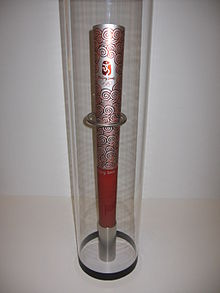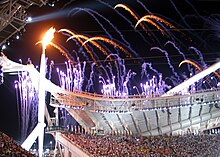Summer sports series: WikiProject Olympics





With the 2012 Summer Olympic Games beginning this weekend in London, we decided to catch up with the chaps at WikiProject Olympics. The last time we interviewed WikiProject Olympics was in February 2010 when the project was gearing up for the Winter Olympics in Vancouver. We wanted to know how the project has grown since then and whether preparing for a Summer Olympics was more grueling.
How long have you been a member of WikiProject Olympics? Have you contributed to any of the project's Featured or Good Articles?
- Basement12: I joined WikiProject Olympics at the start of the 2008 Games in Beijing, since then I've worked on a number of Good Articles, particularly relating to the Great Britain team and have helped get Paralympic medal tables to Featured List status.
- LauraHale: A few months. I have helped take 11 articles about women's water polo players going to the 2012 Olympics to GA and worked to nominate Lauren Jackson for GA. I've worked on three articles about Paralympians that have gone to GA.
The last time we interviewed WikiProject Olympics, the project was revving up for the 2010 Winter Olympics. How has the project changed since then? Do you feel confident that the project can handle future Olympic Games?
- Basement12: Personally I haven't been that active in the last 12 months but I'd say that the work put in during the 2008 and 2010 Games to standardise the formats for the various styles of article the project deals with means that we are now better equipped to handle future Games.
- LauraHale: Not sure how it has changed, but I think it can do a good job. A lot of that comes down to different national groups working with specific sports to work together to improve content together. The major challenge is making sure things have sources when adding them.
With the 2012 Summer Olympics just days away, have you noticed any differences in the way the project prepares for a Summer Olympics compared to a Winter Olympics? Do the sports associated with the Summer and Winter Games attract different editors to WikiProject Olympics?
- LauraHale: The Summer Olympics have more work being done that is supported by Wikiprojects. We're beginning to talk about 2014 and sending more Wikipedians to the Winter Paralympics, what work we can do right now with the summer to help justify Wikimedians getting press credentials for the Winter Olympics.
With London hosting this year's Olympics, do you expect photography will be easier or harder to acquire? Have you already lined up some Londoners to snap pictures of the venues and events? What other ways can residents and visitors in London help the project meet its needs?
- Basement12: The major problem with obtaining photography has been finding pictures released under a suitable license, however with increasing numbers of people uploading their photos to online sharing sites I would hope we'll be able to find more. As a Londoner who'll be attending the Games I hope to be able to provide some photos myself and would encourage others to do so.
- LauraHale: The IPC has made it clear that pictures taken at the Games can only be licensed as CC-BY-NC. The IOC is probably more restrictive or as restrictive. This makes it harder to do things. That said, if some one wants to get pictures of their Olympians and Paralympians, they could if they have the determination to make it happen in advance. In Australia, we have profile shots of the women's national water polo team, quality training pictures of the Australia women's national basketball team and some head shots of the Australian gymnastics team. We also have a few pictures of Paralympians, including a rower and four track athletes. These were attained by gaining press access to media events, demonstrating a track record of success, etc.
How well are past Olympics covered by Wikipedia? Are there any glaring gaps in coverage? What resources are available for researching historical events, competitors, and venues?
- Basement12: I think we've reached a point where the majority of results from previous Olympic Games are included but there is often a lack of prose to flesh things out. Coverege of the Paralympics is less complete but has been improved greatly since the founding of the Paralympics Taskforce. The best sources for Olympic Games are the official reports, produced after each Games by the Organising Committees, and results databases such as sports-reference.com. For the Paralympics the online database provided by the International Paralympic Committee is possibly the most useful resource.
- LauraHale: The coverage of women can be lacking. The older things are at times, the less the quality is. Pictures for competitiors during the 1960s, 1970s, 1980s and 1990s are often lacking. Some countries have better coverage than others and some sports have better coverage than others. Often, it comes down to who puts the effort to write things up. For Australia, I like to use the National Sport Information Centre. They have a fantastic library, including bid books from the games, result books, magazines. http://trove.nla.gov.au is a fantastic Australian resource for older stuff. I've wandered down to NSIC to get information for people.
Have you been involved with the Paralympics or Olympic Bids task forces? What role do the task forces play in improving Wikipedia's overall coverage of the Olympics?
- Basement12: I've been involved with the Paralympics taskforce. Paralympic articles require as much work as those for the Olympics but attract less editors, the taskforce is essential for writing and maintaining articles relating to its events and athletes that may otherswise be neglected.
- LauraHale: Been involved as a member of the HOPAU project to improve Australian Paralympians. When we started last May, we had about 30 Australian Paralympic related articles. Now, we are over 300 and two Australians will go to the London Games to cover them for Wikinews and Wikipedia. We got through at least 35 articles to DYK, and 5 articles to GA. This has had a flow on effect for getting articles about the 2000 Summer Paralympics, and New Zealand articles improved. Australians have also done work with Estonians that resulted in at least one Estonian Paralympic DYK. I don't know that the task force does much as the level of participation is low. In this case, I think chapter and national related work has been a bigger driver in improving coverage though the task forces do play a role.
What are the most urgent needs of WikiProject Olympics? How can a new contributor help today?
- Basement12: Whilst there is plenty of work still to be done on older articles those relating to 2012 are likely to receive vast amounts of traffic in the coming weeks so are a more pressing need. The 2012 Games will feature over 300 events, 200 nations and 10,000 athletes all of which will have articles that will need to updated or written from scratch. I'd encourage editors to start work on articles relating to their home nation as they may have access to local news/media sources that may not be available to others, alternatively you could try adopting one of the nations whose pages haven't updated.
- LauraHale: Start improving articles about competitors in your country. Develop relationships with sport organisations to help content improvement work: get permission to take pictures of athletes for Commons, interview them and report on them for Wikinews and take articles to DYK. This is urgently needed for going forward. Beyond that, find your favourite Olympian who doesn't have an article yet and take them to WP:DYK. It is simple and great way to get involved.
Next week we'll gallop down the final stretch. Until then, study the odds in the archive.


Discuss this story
Just wanted to comment that the 1932 Winter and Summer, and the 1960 Winter Official Reports are in the public domain. Either they were not copyrighted at the time or copyright was not renewed.--Wehwalt (talk) 11:17, 24 July 2012 (UTC)[reply]